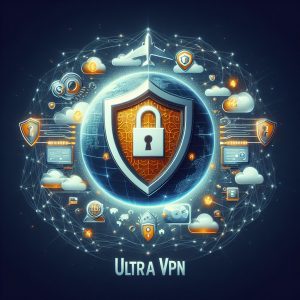I. Introduction
A Virtual Private Network (VPN) is an encrypted connection over the internet that allows users to access the web more securely and privately. When connected to a VPN, all traffic going between the user’s device and the websites they visit is encrypted. This prevents hackers, internet service providers (ISPs), and even government agencies from being able to see the user’s online activity and steal sensitive information like passwords or financial data.
Using a VPN is especially important when connecting to public Wi-Fi networks, which are notoriously easy for bad actors to intercept. A VPN protects the user even on unsecured networks by creating a tunnel that hides their browsing activity. With threats to personal privacy increasing, VPNs have become an essential tool for many internet users who want better security and more control over their data.
II. UltraVPN Overview
UltraVPN is a VPN service provided by the Aura/Pango group, a major player in the VPN industry with ownership stakes in dozens of VPN companies and brands. UltraVPN offers many standard VPN features but has faced criticism regarding certain security and functionality issues.
As one of Aura/Pango’s many VPN products, UltraVPN leverages the company’s extensive server infrastructure spanning over 140 countries. This vast server network allows UltraVPN to offer robust speeds and circumvention capabilities for bypassing internet censorship and geoblocks. Users can manually select from over 3,000 worldwide server locations.
Key features include unlimited bandwidth, support for torrenting P2P traffic, and the ability to connect up to 10 devices simultaneously per account. As a VPN focused on speed and performance, UltraVPN also provides specialized streaming servers optimized for using services like Netflix and BBC iPlayer.
However, UltraVPN has experienced problems regarding security and reliability. There have been reported leaks of users’ real IP addresses and DNS requests, indicating issues with UltraVPN’s ability to maintain a secure encrypted tunnel consistently. Reviews also cite wrong server locations displayed in the app that don’t match the user’s actual connection.
Additionally, independent audits have uncovered that UltraVPN’s advertised “kill switch” feature fails to terminate internet access when the VPN disconnects, exposing users’ data. This means that users’ real IP addresses and location could accidentally get revealed if the VPN drops without warning.

III. UltraVPN Review
An in-depth evaluation of UltraVPN across various categories finds a service that offers great speeds but falls short regarding privacy protections and application functionality.
In testing, UltraVPN provided fast connection speeds across both local and international servers, with minimal latency and quick downloads. Rarely did speeds slow enough to hamper everyday browsing or streaming needs. However, VPC and DNS leak checks showed occasional failures in encrypting traffic through certain servers.
UltraVPN’s logging policy promises not to collect any user activity logs or connection logs. But a closer look reveals they do store logging timestamps, IP addresses at the start and end of sessions, total data usage per day, and connection duration. While decent compared to other VPNs, this may give enough metadata for governments or legal authorities to identify and track certain users.
Up against leading rivals like ExpressVPN and CyberGhost, UltraVPN cannot match the sheer number of server locations, supported platforms, and security certifications. Key gaps include lack of support for routers, Linux OS, and no independent audits from firms like PricewaterhouseCooper. Customer support also lags with limited avenues for troubleshooting compared to the 24/7 live chat offered by most VPNs.
However, UltraVPN frequently offers massive discounts that make its 2-year package less than $60 total. This competes well versus higher-tier VPNs charging over $100 for similar plans. Users seeking an affordably priced VPN may find this deal from UltraVPN enticing. But more privacy-conscious customers may still prefer paying more for unverified logging policies from other providers.
IV. UltraVPN Subscription Offer
Currently, UltraVPN is promoting a special deal targeted towards new users signing up for a 2-year subscription. Users can get UltraVPN for only $2.15 per month, along with a free year of VirusDie antivirus software, for a total price of $54 billed upfront.
This discounted rate represents nearly 75% off UltraVPN’s regular monthly price. It helps offset limitations around logging and leaks given users can lock-in service for low monthly costs. Compared to short-term plans that restrict subscriptions to just 1 month for $9.99 or 1 year for $4.99/month, the 2-year offer gives by far the most savings.
The added VirusDie antivirus app further complements UltraVPN’s VPN protection for securing devices. But reviews suggest the antivirus software itself offers mediocre performance coupled with intrusive upselling tactics pushing users to overpriced real-time protection plans. Users satisfied with their existing antivirus programs may find limited value in VirusDie.

V. Industry Insights
The controversy surrounding UltraVPN’s issues with privacy and inconsistent service shine a light on the massive VPN ownership conglomerates behind many popular VPN apps. Research traces UltraVPN and its parent company Aura back to Pango Inc, a software firm managing at least half a dozen subsidiaries linked to dozens of white-label VPN offerings like HexaVPN, SafeVPN, and RabbitVPN.
Pango strategically conceals its portfolio web of VPN brands and refusal to disclose entire company structures means most ordinary customers remain unaware they are ultimately handing over their personal data to the same parent entity. This trend of consolidation raises significant questions given Pango combines control over extensive user data across VPNs, antivirus software, mobile ad networks, and search browsers.
Growing evidence suggests that many large VPN companies prioritize aggressive expansion over properly securing infrastructure. The global scale of these networks leaves many vulnerabilities that hackers or authorities could exploit to deanonymize users across seemingly unrelated VPN apps. Those valuing true privacy should exercise caution when researching any VPN provider’s ownership and track record.
VI. Alternative VPN Solutions
For users uncomfortable entrusting their VPN needs to opaque giants like UltraVPN and industry titans trading away privacy for market share, open-source nonprofit options present an ethical alternative.
Outline, created by Google’s Jigsaw incubator, offers a totally transparent VPN built solely for journalism and human rights-focused groups. Its unique model relies on volunteers running Outline servers on spare computing resources, lowering costs to keep the service free for users. Outline publishes all code for auditing on GitHub, detailing every aspect of its encryption implementation, supported device configurations, connection protocols, and access controls.
Volunteer-run networks like Outline eliminate the financial incentives driving other VPNs to secretly sell user data or withdrawal privacy features arbitrarily. Since Google provides only technical guidance and infrastructure templates for volunteers, no central authority controls user access across Outline’s decentralized mesh of servers. This architecture prevents many forms of exploitation, censorship, and coercion prevalent across even top commercial VPN services.
Those less concerned with absolute state-level privacy threats but still seeking a reputable VPN can turn to CyberGhost and ExpressVPN. Both independent services boast large global networks with rock-solid no-logging policies verified through external audits. Their vibrant brands lacking links to any known parent entities also suggest sustainable user-first missions over short-term shareholder returns.

VII. Conclusion
In review, UltraVPN offers high speeds but cannot rank among top VPN picks given multiple reports citing security flaws like IP leaks and faulty safeguards when connections unexpectedly drop. Mix that with evidence of deceptive marketing around server locations and actual logging practices, and UltraVPN looks clearly inferior to rivals like ExpressVPN for privacy-conscious users.
Of greater concern, UltraVPN’s secretive corporate ownership by software conglomerate Pango raises alarming questions given the company’s hidden network compromised of dozens more VPN services, ad networks, and antivirus apps. This sprawling level of access over user data and devices poses unprecedented risks should vulnerabilities get exploited or surveillance expansion accelerate.
Those seeking maximum control over their privacy may feel most comfortable avoiding centralized VPN giants altogether by running volunteer-backed services like Outline or paying premium prices for audited industry leaders like CyberGhost. But for users focused chiefly on streaming and downloads, UltraVPN provides capable performance at very affordable long-term rates – albeit with compromises around transparency and application stability.